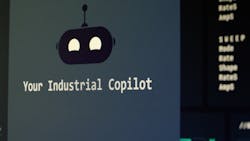With Industrial Copilot, Siemens and Schaeffler help make Gen-AI ‘industrial grade’
What is generative AI exactly? Industrial IT and OT professionals and their partners in C-suites have searched a bit this year to find applications and understand the implications of the software, popularized by large language model-based ChatGPT, developed last year by OpenAI.
Generating song lyrics based on technical manuals is fun, but what can it do for your business? Two manufacturing giants are trying to figure that out.
See also: Generative AI (like ChatGPT) is changing manufacturing ... but how, exactly?
Siemens Digital Industries and Schaeffler, a German motion control manufacturer of rolling bearings for automotive, aerospace, and industrial applications, say they have developed a powerful tool that features Gen-AI, a pilot product called Industrial Copilot.
The companies see two breakthrough applications in the near term: Generating machine instructions that companies like Schaeffler require in large quantities, when human coders often can’t produce to that volume. And, it introduces next-level automation into existing factory-floor machinery.
Erik Scepanski, innovation manager for Siemens Digital Industries, this week walked Smart Industry through the AI-powered assistant for production machines that had a well-received unveiling before Thanksgiving outside the U.S. at the Smart Production Solutions 2023 trade show in Nuremberg, Germany.
Siemens and Schaeffler unveiled a machine augmented with generative AI. “There was huge interest at SPS,” Patrick Lunz, who heads media relations at Siemens Digital Industries, said in a Nov. 28 chat with SI. “This shows what Industrial Copilot can do, which is more than a bit of a breakthrough.”
So, what can Industrial Copilot do?
Siemens touts the AI assistant as “AI for industry,” which only this year has started to come into focus. And Scepanski noted during the Nov. 28 video interview with SI, though the technology is its pilot stages with applications at Schaeffler plants outside the U.S., Industrial Copilot is “pioneering” in that it uses “IT technology to make OT people more effective, to solve some of the problems we’re seeing in OT.”
The system “connects menus, all the information related to the machines, and then you are able to access the static data, just by asking questions,” Scepanski noted. “For example, ask ‘I see the machine isn’t running’ and Industrial Copilot is able to answer the question as to why that machine isn’t running.”
It’s a “new way of human-machine cooperation,” he added. Through use of AI, he also remarked, “the machine answers in a human-readable way.”
See also: AI is taking KPIs to the next level for the factory floor
Lunz said “even an unskilled machine operator would be able to do some of the maintenance.” For example, during off hours, a production line must continue to operate but a skilled engineer might not be available to diagnose and solve issues with costly downtime imminent. The AI assistant provides a lifeline in this scenario, Scepanski and Lunz said.
Siemens Digital Industries officials say the copilot solves major challenges in an industry where there are shortages of skilled living, breathing humans and ever-shortening innovation cycles. “There has been trouble finding automation software engineers,” Scepanski added.
Plus, with natural language input, maintenance teams can identify and resolve errors quickly, reducing the time and likelihood of errors.
As the pilot company, Scepanski added, Schaeffler provided Siemens with textual guides to the writing of the automation code it needed and copilot generated the instructions.
Digging into use cases
To support engineers with automation tasks, the AI-powered assistant links to Siemens’ engineering framework, Totally Integrated Automation (TIA) Portal. Data from that system feeds the AI, giving the ability to generate code faster for Schaeffler’s programmable logic controllers (PLC), the devices that control most machines in factories worldwide. Engineering teams can cut time, effort, and the chance of errors by generating PLC code through the natural language inputs.
See also: Gen-AI leads back to reducing downtime on the line
With industrial companies speeding up their automation and digitalization, there is an increasing demand for experienced automation engineers to implement these projects. Industrial Copilot also helps automate repetitive tasks, freeing up engineers for higher-value work. It will also empower less-experienced shop-floor employees to grow into engineering roles.
“Driving the digital transformation is a top priority for Schaeffler, and it plays a key role in our company strategy,” CEO Klaus Rosenfeld said.
Finding and fixing errors before costly downtime
Industrial Copilot has access to all relevant documentation, guidelines, and manuals to assist shop-floor workers with identifying possible errors. These capabilities enable maintenance teams to identify errors and generate step-by-step solutions more quickly, Siemens Digital Industries engineers said. This will help to significantly reduce machine downtime, make industrial companies more efficient and support sustainability.
“This is the beginning of a new era: In the past, we had to speak to machines in their language. With … Industrial Copilot, we can speak to machines in our language,” said Cedrik Neike, a member of the managing board of parent company Siemens AG and the CEO of Siemens Digital Industries.
“In few years, AI will be omnipresent in industry. Siemens and Schaeffler are front-runners, joining forces to make generative AI industrial grade.”
About the Author
Scott Achelpohl
Head of Content
I've come to Smart Industry after stints in business-to-business journalism covering U.S. trucking and transportation for FleetOwner, a sister website and magazine of SI’s at Endeavor Business Media, and branches of the U.S. military for Navy League of the United States. I'm a graduate of the University of Kansas and the William Allen White School of Journalism with many years of media experience inside and outside B2B journalism. I'm a wordsmith by nature, and I edit Smart Industry and report and write all kinds of news and interactive media on the digital transformation of manufacturing.

